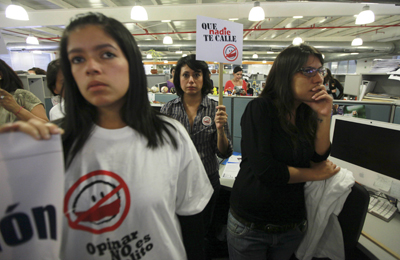A controversial ruling by a Venezuelan court banning print media from publishing images of violence was partially reversed on Thursday following an international outcry from media, rights groups, and United Nations and Organization of American States officials.
Larry Davoe, legal director of the government ombudsman’s office, said during an interview for the state-owned TV station Venezolana de Televisión (VTV) that the court had lifted an order barring all print media from publishing violent images for one month. But two papers are not included among “all,” it seems.
On August 13, the Caracas-based daily El Nacional published an archival photograph of corpses piled up in a local morgue as part of a front-page news report on rising crime. On Monday, a court banned El Nacional from publishing “images, information, and publicity of any type that contains blood, guns, alarming messages, or physical aggression that could alter the psychological and moral well-being of children and adolescents,” said the order, which CPJ reviewed. The prohibition was issued as a temporary injunction while the court makes a final decision in the case, the paper’s lawyer, Ramón José Medina, told CPJ.
Tal Cual reprinted El Nacional‘s morgue image on Monday in a show of solidarity. While the general ban has been lifted and El Nacional is now allowed to publish news of violence, temporary photo prohibitions remained in place against El Nacional and Tal Cual. Both dailies are critical of the Venezuelan administration.
The court’s order drew criticism among media and international press freedom advocates. Teodoro Petkoff, editor of Tal Cual, said that rampant crime is at the heart of the matter. El Nacional’s editor Miguel Otero told CPJ the court orders are aimed at curtailing press coverage of crime before the September 26 legislative elections.
CPJ also described the decision as an attempt to censor news coverage of widespread crime. Catalina Botereo and Frank La Rue–the U.N. rapporteurs on freedom of expression–and the OAS said in a joint statement that the ban constituted censorship.
President Hugo Chávez lambasted the decision by the print media to publish the photo, which he described as “pornographic,” press reports said. The Venezuelan president said the publication was a strategy by the opposition aimed at attracting voters in next month’s elections.
New outlets have reported that one of the main concerns among Venezuelans is personal safety. Today El Nacional reported that there were 19,133 murders in Venezuela in 2009, citing figures from the National Statistics Institute that have not yet been publicly released.
